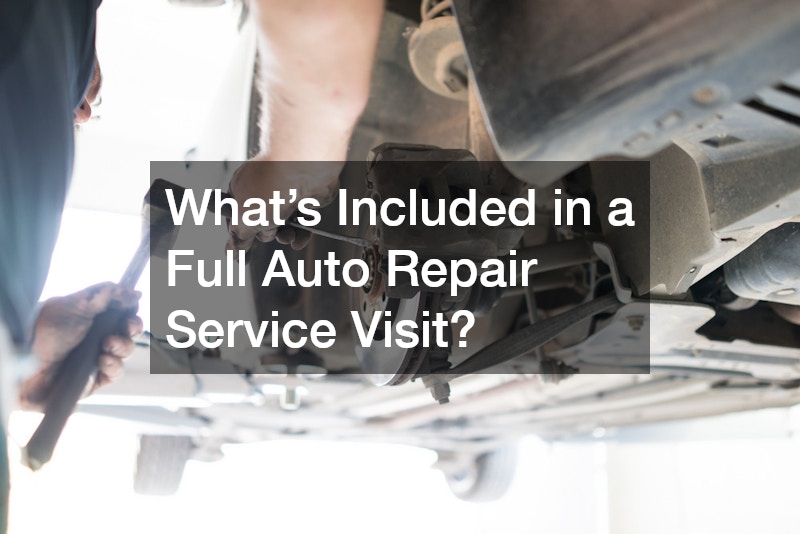Understanding what to expect during full auto body repair services can help you better prepare and communicate with your mechanic. A comprehensive service not only encompasses a variety of checks and maintenance procedures but also provides peace of mind by ensuring your vehicle is in optimal condition. In this guide, we will delve into the critical components of a full auto repair service, from standard checks and recommended service intervals to preparation tips and common concerns.
The Standard Checks During a Full Auto Repair Service
Engine and Transmission Assessment
Mechanics will typically start by assessing the engine and transmission, ensuring all systems are functioning properly to avoid major breakdowns. The engine serves as the heart of the vehicle, and a thorough examination includes checking for leaks, wear and tear, and any abnormal noise. This proactive approach helps in identifying potential issues before they become significant problems, contributing to the car’s overall reliability.
Another critical component is the transmission system, as it allows the vehicle to shift gears smoothly and efficiently. During the inspection, mechanics will check the transmission fluid levels, look for signs of wear, and evaluate the clutch condition if applicable. By addressing these components early, you minimize the risk of severe transmission failure, which can be costly to repair.
Furthermore, ensuring the engine and transmission are in prime condition helps maintain fuel efficiency. A well-maintained engine runs more efficiently, consuming less fuel and producing fewer emissions. Comprehensive checks of these systems are pivotal in extending the lifespan of your vehicle while ensuring it operates at optimal performance.
Brake and Suspension Inspection
A thorough inspection of the brakes and suspension system is also conducted to ensure the safety and drivability of the vehicle. The brakes are among the most crucial safety features, and mechanics will inspect brake pads, rotors, and calipers to ensure they function correctly. Identifying worn-out brake components early can prevent accidents and costly repairs in the future.
In addition to the brakes, the suspension system is vital for a smooth and controlled ride. Mechanics will evaluate the condition of the shocks, struts, and springs, which are responsible for absorbing road impacts and maintaining the vehicle’s stability. Any signs of wear in the suspension system can lead to increased tire wear and diminished handling capabilities.
Regular inspections of the brakes and suspension are essential for vehicle safety and performance. Ensuring these systems are in top condition reduces the chances of unexpected failures while driving. This preventive measure helps maintain the overall integrity of the vehicle, providing an assurance of safety for you and your passengers.
How Often You Should Schedule a Full Auto Repair Service
Manufacturer’s Recommendations
It is essential to follow the vehicle manufacturer’s recommended service intervals to maintain your vehicle’s warranty and longevity. These intervals are designed to address component wear and fluid degradation over time, keeping the vehicle in optimal condition. Adhering to the service schedule outlined in your owner’s manual ensures that your vehicle gets timely maintenance checks.
Regular servicing as per manufacturer guidelines also plays a crucial role in preserving the resale value of your car. Potential buyers often look for vehicles with a complete service history, reflecting that the vehicle has been well-maintained and cared for. Thus, abiding by these intervals not only enhances the mechanical reliability of your car but also leverages its market value.
Signs That Indicate Immediate Need
Beyond regular scheduling, be aware of specific signs that may indicate an immediate need for a full service, such as strange noises or performance issues. Unusual sounds, particularly from the engine or braking system, can be early indicators of underlying problems. Ignoring these warning signs could lead to more severe issues or total system failure if left unchecked.
Another red flag is a noticeable change in the vehicle’s performance, such as a drop in fuel efficiency or sluggish acceleration. These issues might stem from malfunctioning components or failing systems that need immediate attention. Addressing performance concerns promptly not only fixes ongoing issues but also prevents further damage.
How to Prepare Your Car and Yourself for a Repair Visit
Gathering Necessary Documentation
Make sure to bring all necessary documentation, such as the vehicle’s maintenance history, to assist the mechanics in diagnosing any issues. A comprehensive service history provides invaluable information about past repairs and previous diagnostic findings. This data helps mechanics make informed decisions about necessary repairs, potentially saving time and costs.
Maintaining an organized record of your vehicle’s documentation also aids in warranty claims. Accurate records ensure that all repairs and services are in line with warranty agreements, protecting you from unexpected expenses. Preparing these documents in advance can lead to a smoother service visit and more precise diagnosis and implementation of repair services.
Pre-visit Vehicle Check
Conduct a basic pre-check of your vehicle to familiarize yourself with current issues and relay them effectively to the service team. Simple checks, such as fluid levels, tire pressure, and unusual noises, can provide critical insights into your vehicle’s health. By identifying issues on your own, you can articulate specific problems to the mechanic, potentially expediting the service process.
Performing a pre-check also helps identify any items that need attention before the scheduled service. This step ensures that necessary repairs are not overlooked and that your repair visit addresses all existing concerns. Having firsthand knowledge of your vehicle’s condition allows you to have informed discussions with your mechanic regarding repairs and service requirements.
A full auto repair service aims to comprehensively examine and rectify any vehicular issues. It encompasses a wide range of checks and maintenance procedures, helping ensure that your vehicle remains safe, reliable, and efficient. By understanding the process and preparing accordingly, you help ensure a smoother experience and maintain the longevity of your vehicle.

